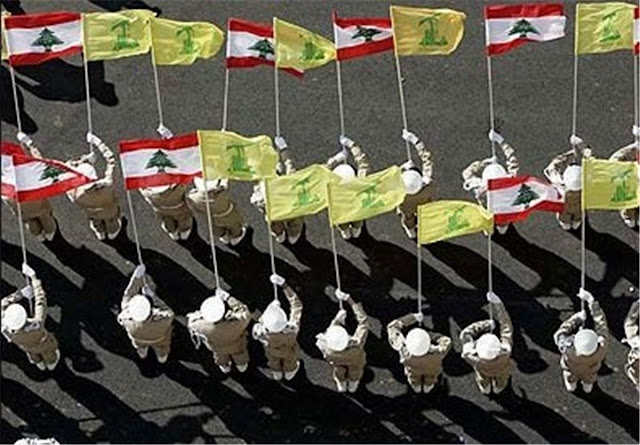Hezbollah is part and parcel of Lebanese security policy. Its terrorist army is not an illegal militia; rather, its role as an official separate entity is enshrined in Lebanon's security formula of "the army, the people and the resistance."
For example, UNIFIL's mandate, under UN Security Council Resolution 1701 (2006), says that it is supposed to
Assist the Lebanese Armed Forces (LAF) in taking steps towards the establishment between the Blue Line and the Litani river of an area free of any armed personnel, assets and weapons other than those of the Government of Lebanon and of UNIFIL deployed in this area.But the Lebanese armed forces has not worked with UNIFIL to accomplish that. Part of the reason is that the Lebanese government itself has given Hezbollah a special status, where it has all the rights of a legitimate army but none of the responsibilities.
A 2021 Chatham House article by Lina Khatib explains how this came to be:
In May 2008, an internal political dispute in Lebanon saw Hezbollah use its weapons against fellow Lebanese citizens. The Lebanese government at the time tried to dismiss the pro-Hezbollah head of airport security, Wafik Choucair, and dismantle Hezbollah’s telecommunications network, which operated without any state oversight. In response, Hezbollah forced a military takeover of Beirut, leading to a government crisis that was resolved with the formation of a new national unity administration in which Hezbollah and its allies had veto rights for the first time.The ministerial statement of this new cabinet referred to a formula previously unseen in government documents, that of Lebanon’s security architecture being composed of ‘the army, the people and the resistance’ to defend Lebanon from any aggression. This statement amounted to a de facto change in the constitution. The same security formula was repeated in the ministerial statement of the next – also Hezbollah-dominated – cabinet formed in 2009, with the additional undertaking that the government would ‘work on uniting the position of the Lebanese through agreeing on a comprehensive national defence strategy’.Hezbollah’s use of weapons to intimidate its opponents paved the way for it to entrench – by force – its special status within the Lebanese state and thus increase its political influence. Since 2008, Hezbollah has regularly invoked the ‘army, people, resistance’ formula to justify its actions. For example, following Hezbollah’s involvement in the Syrian conflict, the group has used the formula to argue that it has strengthened Lebanon against what it calls ‘takfiri’ jihadist threats as well as Israeli threats.
The tripartite formula of "people, army and resistance" is invoked countless times in Lebanese and Iranian media. While the original ministerial statements invoked the formula in the context of defending the areas that Lebanon claims Israel is occupying, like the Shebaa Farms, Hezbollah has used this formula to justify any and every offensive decision it makes as the only official "resistance" part of the triangle - a part that is, explicitly, separate from the army.
The ministerial statements that give Hezbollah carte blanche to do whatever it wants, absurdly, also invoke UNSC 1701, proving that Lebanon only pays that resolution lip service when in fact it fuly supports Hezbollah as a separate yet official militia.
The Lebanese government has given Hezbollah the right to do whatever it wants, as part of its own security architecture. In fact, even the Lebanese army itself accepts and promotes this formula, as this 2009 article shows:
Lebanese Army Commander General Jean Kahwaji called on the military units deployed in the southern region of Lebanon to be vigilant, fully prepared and ready on the ground for various possibilities and to constantly monitor the violations and activities carried out by the Israeli army along the Lebanese border, which indicate the existence of premeditated intentions against Lebanon, its people, army and resistance... stressing the use of all national energies to thwart them.General Kahwaji's speech came during an inspection tour he made today of the military units deployed in the area south of the Litani River, during which he was briefed on the field measures taken to confront any possible Israeli aggression on Lebanon.
The head of the Lebanese Army went to the areas they are supposed to control to be briefed by Hezbollah on what it is doing. He justified Hezbollah's presence there as part of Lebanese policy. Hezbollah is not at odds with the Lebanese army - they are full partners.
Hezbollah can even justify its attacks on Israel since October 8, 2023, as "resistance." "Resistance" is whatever Hezbollah says it is - because it defines itself as "the resistance." The government of Lebanon accepts this definition.
Israel has said that it does not intend to attack Lebanon, but only Hezbollah. Yet Hezbollah is an integral part of Lebanon's security posture.
While Lebanon may not give Hezbollah any responsibilities, Israel has every legal right to hold Lebanon's government responsible for Hezbollah's actions.



